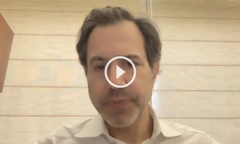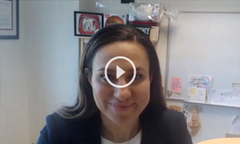
Trials Needed for Sequencing Checkpoint Inhibitors in Bladder Cancer
Petros Grivas, MD, PhD, elaborates on some key unanswered questions on approaches to bladder cancer treatment he discussed with participants at a Case-Based Roundtable event.
Episodes in this series

Petros Grivas, MD, PhD, clinical director of the genitourinary cancers program at University of Washington Medicine and professor at Fred Hutchinson Cancer Center in Seattle, Washington, elaborates on some key unanswered questions on approaches to bladder cancer treatment he discussed with participants at a Case-Based Roundtable event.
Grivas said that one of the biggest questions he discussed with other oncologists is how to treat patients who have received immune checkpoint inhibitors such as nivolumab (Opdivo) and pembrolizumab (Keytruda) in the adjuvant or neoadjuvant setting. Since these regimens were introduced recently, it’s not known whether patients can be rechallenged with checkpoint inhibitors after metastatic recurrence.
No trials have addressed this question yet, but in kidney cancer, there were negative results from the CONTACT-03 (NCT04338269) and TiNivo-2 (NCT04987203) trials. These trials investigated adding checkpoint inhibitors in the second-line metastatic setting in patients who received them in the prior line. Although this could be extrapolated to conclude that rechallenge would not be effective in bladder cancer, trials in this bladder cancer setting would be ideal, Grivas said.
Other sequencing questions pose challenges as well, such as what to give after pembrolizumab plus enfortumab vedotin (Padcev) and how to sequence other therapies with erdafitinib (Balversa) when given to patients with FGFR alterations.
Finally, he said that research into driver mutations for bladder cancer has shown the importance of germline mutation testing to patients and their families. Testing and genetic counseling can lead to screening for other cancers for early detection.
TRANSCRIPTION:
0:10 | I think this is really showing the interest that bladder cancer as a disease has attracted over the last decade. With more therapy options for our patients, there are many unanswered questions, and that's why we need clinical trials to answer those questions. For example, what is the role of rechallenging patients with a checkpoint inhibitor if they already received that checkpoint inhibitor before in the localized disease setting, perioperatively or adjuvantly? Do you use a checkpoint inhibitor again, maybe concurrently with enfortumab, if the patient has a metastatic recurrence? That's an ongoing question. I think we've tried hard to answer those questions through clinical trials.
There are different perceptions, of course, across experts. If someone has progression on checkpoint inhibitor, we have lessons learned from kidney cancer, for example, that based on trials, they are the CONTACT-03 and the TiNivo-2, that rechallenge with a checkpoint inhibitor after progression on checkpoint inhibitor did not benefit patients. The CONTACT-03 and TiNivo-2 were negative trials. How do these data extrapolate or apply to metastatic urothelial carcinoma? We need, ideally, trials in that setting to answer this question of checkpoint inhibitor rechallenge in this disease.
1:24 | Of course, [we have] many other questions [such as] subsequent therapies after pembrolizumab and enfortumab, optimal sequencing of therapies, the role again, of next-generation sequencing, [and] erdafitinib, how do you sequence that FGFR inhibitor after frontline therapy.
The other parallel thing is that we learn more and more about germline mutations in urothelial carcinoma. There is a more and more need to send these patients for germline testing and genetic counseling to benefit the patient, and also the broader family in terms of cancer prevention screening, etc.













































